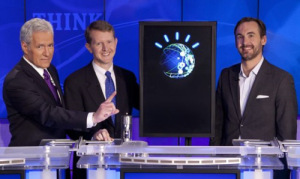I promised in January that I’d write up my technology predictions for 2011, but given that we’re already a quarter done the year, that would seem kind of foolish. I was actually always leaning toward taking a further-out view into the future anyway, as it’s not only more fun but also harder to be wrong (ahem). In that vein, given that I’m currently on vacation in Thailand, I thought I’d kick off 10 days of predictions of where we’ll be 10 years from now. I hope you enjoy.
 Let’s start with computers, which are a hot topic right now given the recent performance of IBM’s Watson on Jeopardy. Watson’s ability to make its super-smart human opponents look like tools on the game show has been thoroughly discussed and analyzed. One of the more interesting takes appeared in the Ottawa Citizen, which postulated that Watson’s performance was not completely unlike the Wizard of Oz - it was actually an illusion that required someone behind the curtain to pull the strings.
Let’s start with computers, which are a hot topic right now given the recent performance of IBM’s Watson on Jeopardy. Watson’s ability to make its super-smart human opponents look like tools on the game show has been thoroughly discussed and analyzed. One of the more interesting takes appeared in the Ottawa Citizen, which postulated that Watson’s performance was not completely unlike the Wizard of Oz - it was actually an illusion that required someone behind the curtain to pull the strings.
Most commentators, however, gravitated toward how Watson figures in to the issue of the Singularity, or the upcoming point in time when computer intelligence outstrips our own, thereby resulting in a new world that is currently hard for our mere human brains to imagine. The Singularity is something a number of futurists, most notably Ray Kurzweil, have pondered for years. I’ve been knee deep in it for several months, since I read Kurzweil’s latest book, The Singularity is Near, and it will actually be somewhat central to my next book (check out my interview with Kurzweil from a few months back).
This event won’t arrive in the next 10 years - Kurzweil thinks 2045 is the year when everything will change - but what is very likely to happen is that computers will in fact become more powerful than humans. And by powerful, I’m talking strictly about their computational ability. Super-computers such as Watson, which is capable of 80 trillion operations per second, will continue to see the benefits of Moore’s Law - where computational ability roughly doubles every 18 months - for the next decade. By that measure, super-computers in 2021 will be capable of more than five quadrillion calculations per second.
Many very, very smart people have tried to estimate the computational ability of the human brain based on what we know about the organ - how many neurons it has, how fast they operate, and so on - and there have been various conclusions. The one I’ve seen most often seems to estimate the human brain as capable of 100 million MIPS, or millions of instructions per second. I’m no mathematician, but that’s less than what the most powerful computers will be capable of in 10 years.
What does this mean? Well, there are a few things to keep in mind. Firstly, much of our brain’s computational ability is spent on running the body - regulating our organs, making sure we blink, walking and chewing gum at the same time, etc. One idea that fascinates me is what might happen if we could perhaps outsource some of these mundane tasks to a computer that we wear? If we freed up most of our brain power, could we possibly orient it toward more productive uses? Perhaps, but that’s getting outside the scope of the next 10 years.
Indeed, although super-computers that have more brute power than the brain are likely in the next decade, their true impacts won’t be felt just yet because of their size and cost. Watson, for example, is actually made up of 10 refrigerator sized stacks and cost several billion dollars. It’ll likely take another decade just to get such computers down in size and cost to the point where they can have a mainstream effect. Of course, by 2021, we’ll have Watsons on our desktops and smartphones, so it’s all relative.
These super-computers are already affecting change in the world, although it’s in ways we don’t really perceive. If you don’t believe me, open up a new browser tab and do a Google search on something, anything. If you’re amazed that the search engine seems to complete your query before you even type it, well, welcome to super-computers in action. Faster and smarter machines are already analyzing and interpreting our data for us. This sort of stuff is going to be all around us over the next decade.
The real fun begins when these super-computers start to interact with human brains. Our organic matter doesn’t directly benefit from Moore’s Law like computers do, but as I’ll detail in tomorrow’s prediction, the brain will in fact be redefined over the next 10 years.

Mark
March 1, 2011 at 9:24 am
On the one hand, computers have been able to outmath us almost since the very first computing machine.
On the other hand, I still can’t get one to accurately transcribe my handwriting after extensive training.